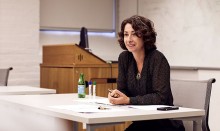Professor Shiri Breznitz is an economic geographer who specializes in innovation, technology, commercialization and regional economic development. Awarded tenure in June, Breznitz contributes to the world by passing on the valuable lessons she’s learned throughout her career to her students.
Describe your big “a-ha” moment.
I was doing my Master’s at the University of Massachusetts and in one of the courses we had to follow an urban project from beginning to end. My project was “University Park at MIT“, an urban renewal project at the Massachusetts Institute of Technology that includes life science research buildings, residential units and office spaces. Though the space did not target biotechnology firms, the developer realized that the majority of University Park tenants were biotechnology companies. While interviewing these companies for my project I realized that a lot of them wanted to be in the area because they wanted to be close to MIT. For me, that was the “a-ha” moment: understanding the impact that universities can have on neighbourhoods. A university can either make a decision to be a contributing citizen or keep to itself. University of Toronto is a great example of a university that is highly connected to the city to the point that some people don’t even see the amazing impact that it has. If you take U of T out of the heart of this city, things would change dramatically — socially, culturally and economically.”
What’s a global issue that you’re passionate about and why?
I’m very much interested in education and economic development. Through my work, I look at different aspects of how universities contribute to their local community. People don’t talk enough about the main role of a university — teaching! We teach. Our main work is not patents or licenses...it is actually teaching students and, hopefully, helping to shape them into engaging individuals. Through that, we promote our society and the economy.
Who has influenced you most in life and why?
I think different people influence you over time. My parents were very involved parents when I was growing up. They talked about how much you need to develop yourself and put some of yourself into your work. Without their support, I would have never left Israel or tried something new and developed an entire career — I came from the insurance world, so for me, teaching is a totally different career that I started later in life.
There’s also a few strong women that influenced me. My mentor Mary Frank Fox, from the School of Public Policy at Georgia Institute of Technology; my very good colleague and friend at the same school, Kimberley Isett and my post doctorate advisor, Maryann Feldman, from UNC Chapel Hill, taught me how to be a dedicated academic and a leader. I also have my PhD advisor to thank for helping me make the decision to go into the academic realm. I was going to refuse my acceptance to University of Cambridge — I was worried about whether it was too late in life for me to start my PhD. But my advisor, Mia Gray, told me: “You need to fulfill yourself. This is something you’re passionate about. You can achieve what you want and still have your family and your life.”
After we met, I decided to complete my PhD. It was hard, but Dr. Gray was there and she was very supportive.
What impact do you want to make on the world or your local community?
My impact is my students. With my Master of Global Affairs students, it’s important for me not just to teach a specific class, but also to prepare them for the job market and help them understand how policies impact their lives. Ultimately, I want them to think about who they are and how to be a good citizen in their own community. I want them to evaluate policies and to not just accept any decision as given.
What is your personal philosophy?
Have a goal and work very hard towards it.
October 3, 2016.
